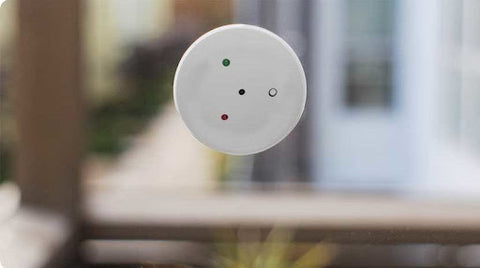As you look around, you'll see that more and more glass is being used in construction. The majority of houses feature huge glass windows. Glass is being used more and more in office structures.
While glass offers many advantages, it also poses a security risk. If a burglar attempted forced entry into your home, they would try to bust open your door or smash open a glass window. When someone tries to pry open a door, it usually triggers an alarm system. Do your windows, on the other hand, have an alarm system? This article will explain what a glass break detector is and why these door and window sensors are so important.
What Is a Glass Break Sensor?

Credit: Echoray
A glass break detector (also known as a glass break sensor) is a type of detector that sounds an alarm when glass breaks. Glass break detectors, like motion sensors, window sensors, and door sensors, are an important aspect of a complete security system.
Glass break detectors are unique in that they detect not only when windows and doors open, but also when windows and sliding glass doors are broken. They work to protect your family from a burglar or invader who might want to steal your goods or inflict pain on your family.
How Does a Glass Break Detector Work?

Credit: Vivint
When a glass pan shatters, it makes a "thud" sound. This is complemented by a variety of other sounds produced by the cracking of glass into smaller fragments.
There is a definite frequency to these cracking sounds. Glass break sensors work by using these frequencies to identify whether or not the glass is shattered. The sensor sets off an alarm once it has been determined that there has been a glass break.
Types of Glass Break Detectors
The following main categories can be used to categorize these detectors:
Acoustic Glass Break Sensors

Credit: Interlogix
Sound wave frequencies trigger an acoustic glass break sensor, which can detect glass shattering from up to 20 feet away. Small microphones in acoustic sensors listen for the precise frequencies of cracking the glass. Your acoustic glass break detectors should be placed around easily accessible windows or a sliding glass door (typically on the ground floor) that could provide an invader easy entrance to your property.
Shock Glass Break Sensors

Credit: Brinks Home Security
Shock glass break detectors detect the distinctive vibrations of glass breaking by "feeling" them. They must be firmly connected to the window or door they are protecting in order to function effectively.
Shock sensors are noted for causing fewer false alarms than acoustic sensors, but they have a number of disadvantages. For instance, you'll need to install a sensor on each window you want to keep an eye on. You cannot use a single sensor for multiple windows or doors.
Active Detectors

Credit: Bosch
These detectors deliver a set of frequency energy towards the window glass panes and then detect the frequency energy reflected back. Any variation in the reflected frequency energy sets off an alarm or switches on another circuit.

Changing the Device’s Sensitivity

Credit: Perfect Home Defense
Many individuals are concerned about false alarms if they accidentally break a glass dish or are watching an action movie while using a glass break detector. When you first install your glass break detectors, you should test and modify the sensitivity levels to avoid false alarms.
Depending on the detector you buy, the testing procedure will vary, but most will contain a "test" button. You'll clap your hands loudly near your windows while testing. For added accuracy, you can play a video of glass sounds.
Even after testing, the possibility of a false alarm exists, so avoid installing glass break detectors in the kitchen or near your television, where other shattering noises are most likely to be heard.
Where Can I Get an Excellent Glass Break Detector?
Credit: Canadian Security Magazine
Glass break detectors are available in a wide range of sizes and styles. However, a customer must seek out a high-quality solution that can address security concerns.
Here are some basic characteristics of a good detector that might assist shoppers in selecting a decent device.
A proper warranty declaration should be included with the goods.
- The product should be up to date in terms of technology and simple to upgrade.
- The product should be simple and straightforward to use.
- It should be tunable and have a reasonable audible range.
- Any system fault should be immediately detectable.
- When purchasing an active glass break detector, the customer must consider the quality of the glass (most notably, thickness), as the detector's efficacy is determined by the thickness of the glass.
Summary
Everyone requires a home security system. However, breaking glass detectors are not required for everyone. You do not need to safeguard your windows if you reside in an upper-floor flat.
Glass-break sensors, on the other hand, provide crucial home security for everyone else. If criminals manage to break into your home while you're away, you'll need an extra layer of security. Travah's diversion safes blend in with your ordinary objects to keep small valuable items like pen drives, small jewelry, and other items hidden from prying eyes. No one will suspect that valuables are kept in this diversion safe, and your belongings will be safe from any robberies that may occur.


